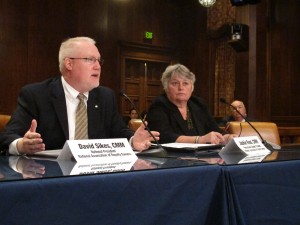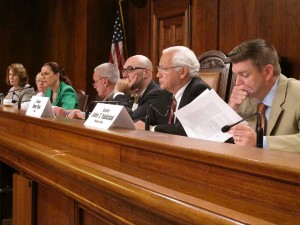Senate Panel Examines Complaints Of Underpaid Gas Royalties

Marie Cusick/StateImpact Pennsylvania
National Association of Royalty Owners (NARO) President David Sikes testifying before a senate committee on gas royalty payments.
A Senate hearing today about gas royalty payments began with a mention of mushrooms.
Joel Rotz is the senior director of state government affairs for the Pennsylvania Farm Bureau. He pointed out the state’s prominence as a top mushroom producer.
“Why do I bring that up?” he asked rhetorically, “Most of you know how you grow mushrooms. Keep them in the dark. Feed them a little manure, and they grow. We’ve got landowners out there right now who are feeling a little like mushrooms.”
As StateImpact Pennsylvania recently reported, some landowners in the state’s most drilled on place — Bradford County — are alleging they’re being cheated out of royalty payments by one of the biggest gas companies in the nation.
Looking for transparency
All over Pennsylvania people have been signing gas leases in recent years with the understanding they’re legally entitled to a certain cut of the money companies make getting the gas out of their land.
State law puts that figure at 12.5 percent—it’s the minimum guaranteed royalty.
Some landowners are now saying one gas company in particular is withholding money form their monthly royalty checks.
They’re told they must share in the costs of moving the gas from their wells to the market, which means paying for things like pipelines and compressor stations.
Jackie Kingsely is a township supervisor in Bradford County and a dairy farmer who owns about 170 acres.
“What are we expected to pay out of that 12.5 percent?,” she asks. “If we’re expected to pay, then it should be clear what we’re paying.”
She was among those who came to Harrisburg today to voice her concerns at a Senate Environmental Resources and Energy committee hearing on the issue.
Confusing deductions
David Sikes flew in from Oklahoma for the day to attend the hearing. He’s the head of the National Association of Royalty Owners (NARO), a group which promotes the interests of mineral owners.
“We’re not seeing the kind of deductions — percentage wise– being taken out in other parts of the country that we’re seeing here, and that’s problematic,” says Sikes.
So which company is taking the heat for the questionable royalty deductions?
“It’s Chesapeake,” he says. “More than once we’ve heard their name mentioned, and that’s unfortunate.”
Chesapeake is the biggest gas drilling company in Pennsylvania and the second largest in the nation.
Doug McLinko is the chairman of the Bradford County Commissioners. He’s a Republican and a gas industry supporter, but says he’s frustrated hearing so many complaints from his constituents.
“We are seeing people with zeros in their checks. Nothing there. We’ve seen people with tens of thousands of dollars in retroactive bills they got after the Kilmer lawsuit.”
He’s reffering to a lawsuit known as Kilmer v. Elexco Land Services Inc.. It lead to a unanimous state Supreme Court decision in 2010, which said companies are allowed to take out these deductions.
The court held that since Pennsylvania’s law didn’t define the word “royalty,” the gas industry can use its own definition and deduct the costs of moving the gas to market.
But Jackie Root, who heads the Pennsylvania chapter of NARO wants to see more accountability in how those costs are calculated.
“This isn’t all about Chesapeake,” she says “The transparency issue is something we need regardless.”
Chesapeake was invited to the hearing but did not attend. The company didn’t respond to a request to comment for this story.
Christopher Jones is a Towanda-based attorney who represents landowners. He told the committee that depending on how the leases are written, it can be difficult and expensive for people to file lawsuits.
He pointed out there’s also no way to check whether drilling companies are accurately reporting the amount of gas they’re producing.
Production data is published by the state Department of Environmental Protection twice a year. It’s self-reported by the industry and not necessarily audited.
“There’s no way a landowner could verify [the state’s data] would correlate to what their statement actually says,” Jones explains.
Legislate or litigate?

Marie Cusick/StateImpact Pennsylvania
The Senate Environmental Resources and Energy committee listens to testimony alleging underpayment of gas royalties.
Senator Gene Yaw (R- Bradford) is the chairman of the Senate committee.
After listening to the testimony, he says he’s not sure why more people aren’t filing lawsuits. He’s doubtful there can be any quick legislative fixes.
“We could take action,” he says, “But that’s not going to solve the problems some of the people face now. I think they need to take action themselves. But the encouraging thing is I think there are avenues for them to pursue it. They’re not alone. They just need to be willing to do it for themselves.”
McLinko thinks lawmakers should revisit the law and define what the word royalty means.
“The question of the day was ‘to legislate or to litigate?’ he says, “It sounded coming from the chairman, litigation was the best way. The best way is legislation.”
There are companion bills in the state House and Senate aimed at promoting more transparency on the royalty check statements, but it’s not clear whether they’ll move anywhere before the legislature passes a budget and leaves for its summer recess.
















